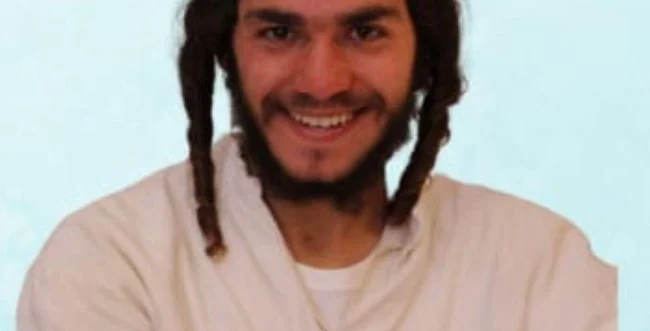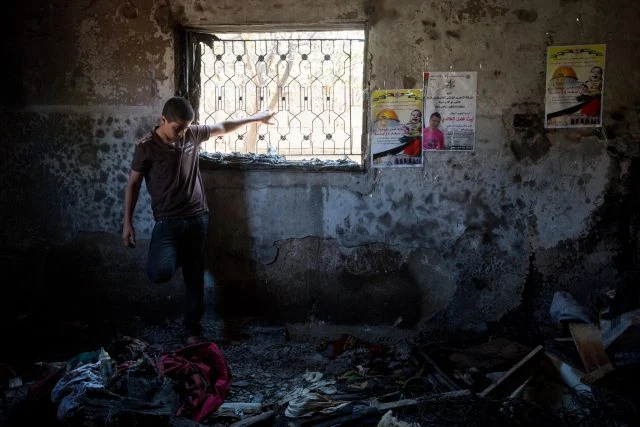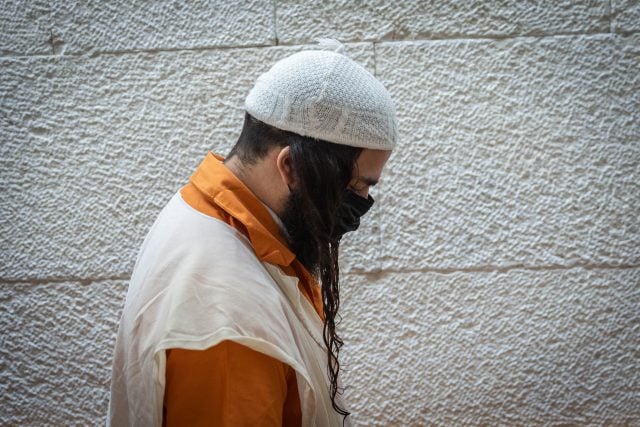Sorting things out: How did they convict Amiram Ben Uliel?
What is the difference between a police investigation and an investigation by the Shin Bet? What is a necessary investigation? And when is it permissible to use "special measures" in an investigation? On what basis was Amiram convicted and what led to it?

So what happened there in the investigation of Amiram Ben Uliel who was convicted of murdering the Dawabsha family? The event from 8 years ago is back and keeps the public busy today. What was Amiram accused of? And how did things turn out? Doing some tidying up
The difference between a Shin Bet investigation and a police investigation
We will first clarify that there is a difference between a police investigation and a Shin Bet investigation. The purpose of a Shin Bet investigation is to extract information in order to prevent a future offense against the security of the state, while the purpose of a police investigation is to investigate a crime that occurred in the past in which the police clarify the suspicion and collect evidence for the purpose of conducting the trial.
In the Shin Bet investigation, there is no obligation to inform the detainee of his right to remain silent, and in any case also of his right to consult with a defense attorney. The Shin Bet has 21 days in which the suspect is in custody to interrogate him without a defense attorney. On the 22nd, the law requires allowing a meeting between the accused and his defense attorney.

On the 17th day, the Shin Bet receives approval for a "necessity investigation"
The Shin Bet had intelligence information about Amiram, but with information alone, it is impossible to convict and therefore he was arrested and received an order to delay meeting with a lawyer for the maximum period of 21 days. Amiram doesn't volunteer information, doesn't talk to the voice-overs in the detention cell and the Shin Bet's time is running out. On the 17th, the Shin Bet receives permission to interrogate Amiram in what is called a "necessity investigation" an investigation that allows special measures to be taken. The judge in the verdict claims that "there is no doubt that these measures caused a great deal of actual physical pain and mental suffering."
The commission ruled that it is forbidden to interrogate under torture and approved moderate physical pressure
For many years, the Shin Bet would beat in investigations and would deny them in court. The accused would claim "We confessed because they beat us" and the Shin Bet, on the other hand, would describe a relaxed and peaceful investigation. When the court had to choose between trusting a Shin Bet man and a defendant, he would believe the Shin Bet. This matter exploded in the case of Izat Nafsu, a Circassian officer who was sentenced to 15 years in prison until it became clear that his confession was forcibly extracted. In 1987, an investigative committee was established under the authority of Judge Moshe Landau, in which Yosi Ginosar, a member of the Shin Bet seats, and he leaks everything that happened in the committee so that the Shin Bet knew what to answer to the accusations against them.
Following the committee, the public was shocked that for many years the Shin Bet had been lying in court, the Landau Committee expressed great shock at the lies of the Shin Bet and ruled that violence should not be resorted to, but moderate physical pressure may be resorted to.
The court states that it is forbidden to use torture with physical pressure at all except "investigation of necessity"
The Shin Bet interprets the moderate physical pressure in a certain way and a petition submitted in 1999 by the Public Committee Against Torture in Israel, accepted the violent interrogation methods of the Shin Bet.
According to all the subjects, moderate physical stress was as follows: the subject was bound with a painful tie in a distorted position on a stool whose slope was reversed, with a sack on his head and deafening music that made anyone's nerves unsettled. This is indisputable, the dispute was whether the sack was with urine or not. The detainees said that he had urine, which the Shin Bet denied. In the course of the interrogation, if the interrogated person did not confess, they would shake his head back and forth at great speed in a violent shake, but one that left no marks.

Following the moderate physical stress, i.e. the shaking, a dead man was interrogated who could not withstand the shaking. The Shin Bet's methods exploded, and in 1999 the Supreme Court stated that these are not investigative methods, but at the same time, it established the "defense of necessity" that protects the Shin Bet if they resorted to violence if there was an actual security need.
After 1999, not all of the interrogated were interrogated violently, but in rare cases, when a person is defined as a "ticking bomb", a person who has information that could prevent the next attack. In such a case, the Shin Bet receives permission for a necessary investigation that is accompanied by "special measures" and it is impossible to prosecute the Shin Bet for that.
On the 17th day, Amiram Ben Uliel is defined as a ticking time bomb, and it is decided to investigate the need for special measures to be taken in the Shin Bet. Amiram admits guilt, but this admission is rejected because it was not a voluntary admission. Amiram does not hand over information about accomplices or about another planned attack.
The confession to the police that she was not under torture is accepted in court
After 36 hours, Amiram is transferred to a police investigation, in the investigation there is a Shin Bet person present who was not present in the initial investigation, but the question does arise as to what he did there. Amiram returns and confesses. This confession to the police was accepted by the court.
Amiram claims that it was clear to him that if he did not confess, he would be returned to the torture investigations again. The court did not accept the claim and relied on the interrogation and the voluntary confession after 36 hours in which he confessed under torture.
On the 21st, Amiram again undergoes a torture interrogation because the next day, on the 22nd, he will already meet with a defense attorney, and the Shin Bet will no longer be able to take him to interrogations. In this interrogation, Amiram does not provide significant information.
The court states that the police investigation clarifies the confession of the investigation of the need.
According to the law, when there is a confession made outside the walls of the court, "something more" must be proven and you cannot rely only on the confession.
The prepared details provided in the investigation
And therefore, the court relied on the prepared details that Amiram gave in the reconstruction. Probable details are details that only the person who committed the offense could know. A qualified detail is a detail that the investigators could not know, but today it is difficult to know if they were not told to the interrogator in the investigation.
The authorized details that Amiram gave according to the verdict "the vehicle parked near the entrance to the houses and its color; the characteristics of the windows through which the Molotov cocktails were thrown; the identification of the window through which the Molotov cocktail was thrown into the house of the Dawabsha family; how this Molotov cocktail smashed against the window bars so that only part of it entered the house; characteristics The Molotov cocktails themselves - green glass bottles; and other characteristics that are unique to the scene of the incident." The verdict adds that the details were not known to the investigators and they became a significant evidentiary supplement.
In the United States, the doctrine of the "poisoned fruit" applies, everything that followed the wrongful confession is rejected as evidence. In Israel, according to the Isascharov rule, a court has discretion to decide whether to accept evidence that was born as a result of previous invalid evidence.
Three years ago, Amiram appealed his confession, which he claimed was made illegally, but his appeal was rejected.
Today there is public pressure asking for a retrial to reopen the case and evidence.